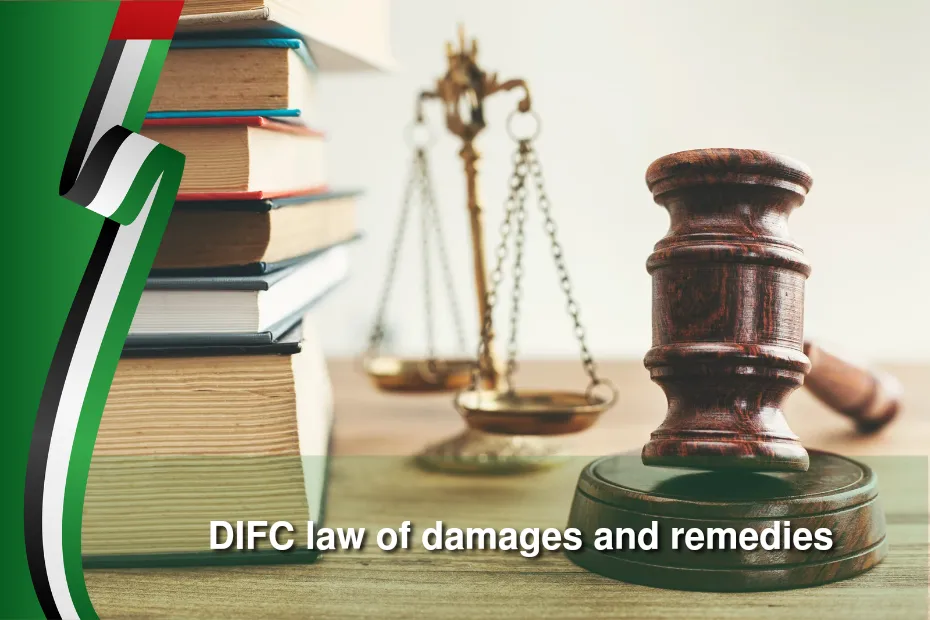DIFC Law of Damages and Remedies, Law No. 7 of 2005, is vital legislation ensuring the just resolution of civil and commercial disputes.
Subsequent amendments have evolved it to meet the changing landscape of international business and finance. This article briefly overviews this law and related legal services for 2025.
Contact our expert lawyers & legal consultants in UAE. Click the WhatsApp icon below.
Table of Contents
DIFC Law of Damages and Remedies
- Original Law: This law was enacted on June 26, 2005, to standardize the calculation and awarding of damages within the DIFC, thereby creating a predictable and secure legal environment for businesses.
- Purpose: Provides clear guidelines for compensation related to breach of contract or torts within the DIFC jurisdiction.
- Compensatory Damages: Aimed at restoring the injured party to the position they would have been in if the harm had not occurred.
- Punitive Damages: Imposed in cases of gross negligence or intentional misconduct to deter such behaviour in the future.
- 2022 Amendment (Law No. 2 of 2022): This amendment introduced changes to streamline procedural aspects of litigation and enhance the clarity of legal processes.
- 2024 Amendment (Law No. 3 of 2024): Updated to integrate digital processes in legal proceedings and expand the scope of applicable cases, particularly in response to technological advancements.
The law of damages and remedies structures what constitutes a compensable claim. Knowing these details helps businesses understand their legal rights and liabilities.
Overview of Damages and Remedies Rules in DIFC
The DIFC Law No. 7 of 2005, also known as the Law of Damages and Remedies, sets clear guidelines for determining compensation when a party fails to fulfill contractual or legal obligations.
This law governs the computation of damages and the types of remedies available for breach of contract and obligations.
Full Compensation and Measure of Damages
One of the fundamental principles under this law is that the aggrieved party is entitled to full compensation for the loss sustained due to non-performance.
This includes compensating for actual losses and any gain deprived by the breach and any incidental or consequential losses arising from it.
For example, if a supplier fails to deliver goods on time, the buyer may claim damages for the price difference between the contract price and the current market price, alongside any additional losses caused by the delay.
Certainty and Foreseeability of Harm
Compensation is only due for losses that can be established with a reasonable degree of certainty.
If the harm caused by the breach is uncertain or speculative, the Court has the discretion to assess the damages.
Additionally, the law stresses the foreseeability of harm, meaning a party is liable for losses reasonably foreseeable when the breach occurred.
For example, if a contractor fails to complete construction on schedule, and the delay leads to financial loss due to missed business opportunities, the contractor could be liable for those foreseeable losses.
Mitigation of Loss
The law also emphasizes the duty to mitigate losses. The aggrieved party must take reasonable steps to reduce the damages suffered.
For instance, if a business has suffered losses due to a supplier’s breach of contract, it should seek an alternative supplier promptly to minimize the loss.
If the injured party fails to do so, the Court may reduce the damages accordingly.
Interim Remedies and Court Orders
The law provides several remedies to the aggrieved party, including orders for specific performance or injunctions and compensatory damages.
These can be granted to prevent further breach or compel the performance of a specific action required by the contract.
For example, when an individual fails to deliver the agreed-upon property, the Court may order them to fulfill the contract.
Find legal services from experienced DIFC court lawyers in Dubai.
Restitution for Unjust Enrichment
Restitution remedies apply when one party benefits unjustly at the expense of another without a valid legal reason.
If an individual mistakenly receives money from a never-executed contract, they may be ordered to return the sum to restore fairness.
As observed, the DIFC Law of Damages and Remedies offers a comprehensive framework to ensure fairness in contractual relationships.
It emphasizes full compensation, loss mitigation, and remedies such as specific performance to address breaches.
Legal Services related to Damages and Remedies Law in DIFC
Al Mulla Lawyers in DIFC, deeply integrated into the centre’s legal landscape, provide tailored services to navigate the complexities of this law.
Expert Services Include:
- Litigation and Arbitration: Specializes in handling high-stakes commercial disputes, with a success rate of over 90% in favour of their clients, and offers arbitration services adhering to DIFC’s unique legal standards.
- Compliance Advisory: Provides regular updates on new amendments and legal reforms to ensure businesses remain compliant and conducts annual legal audits to mitigate risks associated with non-compliance.
- Preventive Legal Strategies: Develops contractual frameworks to minimize dispute risks and provides strategic advice on legal and financial planning based on anticipated changes in the law.
Find more services from top Lawyers in Dubai, UAE.
FAQs about Law of Damages and Remedies DIFC
Navigating the DIFC Law of Damages and Remedies requires a deep understanding of its foundational principles and recent legislative changes.
The amendments in 2022 and 2024 enhanced the law’s scope and application, so businesses operating in the DIFC must stay informed and compliant.
Al Mulla Lawyers ensures businesses understand and use these changes strategically, safeguarding their operations against potential legal challenges.
Contact our law firm in UAE for expert help. Click the Whatsapp icon below.
Omar Al Mansoori is an Emirati legal advisor and researcher with over 10 years of experience in civil, commercial, and corporate law in the UAE. He focuses on simplifying complex legal topics and ensuring that every article published aligns with the latest national legislation and official regulations.
